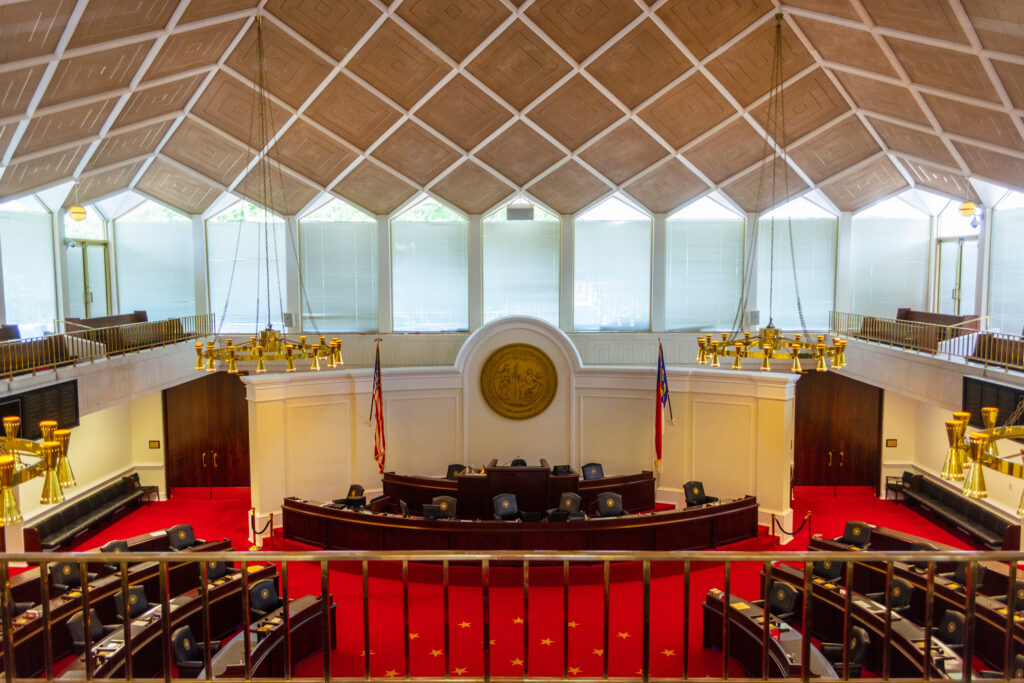Two New Lawsuits Challenge North Carolina Voter Suppression and Power Grab Laws
WASHINGTON, D.C. — On Tuesday, Oct. 17, a coalition of civil and voting rights groups — Democracy North Carolina, the North Carolina Black Alliance and the League of Women Voters of North Carolina — filed a federal lawsuit challenging North Carolina’s recently enacted voter suppression law, Senate Bill 747.
Also today, North Carolina Gov. Roy Cooper (D) filed a lawsuit in state court challenging Senate Bill 749, a new power grab law that removes the governor’s power to appoint members to the state board of elections, granting it to the North Carolina Legislature instead.
Both lawsuits come on the heels of North Carolina’s Republican-controlled Legislature overriding Cooper’s veto of both pieces of legislation last Tuesday.

The lawsuit against S.B. 747 follows two other federal challenges to the anti-voting law.
Today’s lawsuit challenging S.B. 747 is the third federal legal challenge brought against the new anti-voting law. Last Tuesday, pro-voting groups led by Voto Latino brought the first federal lawsuit challenging part of S.B. 747 just minutes after North Carolina’s Republican-controlled Legislature overrode Gov. Roy Cooper’s (D) veto of the legislation. Later that day, Democratic groups filed the second federal case against multiple provisions of the new law.
The pro-voting plaintiffs in the most recent lawsuit specifically challenge provisions of the S.B. 747 that alter the voter registration process for North Carolina’s same-day registrants — those who register to vote the same day that they cast their ballots during the state’s early voting period. According to the lawsuit, S.B. 747’s new same-day registration provisions discriminate against young North Carolinians who disproportionately take advantage of same-day registration and among whom voter participation has significantly increased over the past few years.
The lawsuit brings U.S. Constitutional claims against a provision that allows for the rejection of same-day registrants’ applications and completed ballots based on a single address verification notice sent via the U.S. Postal Service being returned as undeliverable.
Under the challenged provisions, same-day voters are not notified if their ballots are canceled or registrations are denied — nor are they given an opportunity to contest a denial — resulting in voters being automatically disenfranchised often through no fault of their own. As the complaint points out, “[t]he random nature of postal mistakes, delays, and misdirections with no mechanism for curing such error introduces an arbitrary and unnecessary barrier to participation in the electoral process.”
Prior to the enactment of S.B. 747, same-day registrants would not automatically have their registration and vote discarded if they already cast a ballot — even if two address verification notices were returned as undeliverable. Previously, same-day voters also had the opportunity to contest any denial of an application at a hearing.
The new federal lawsuit focuses on how S.B. 747 will disproportionately hurt young voters.
The new lawsuit underscores the increased risk of disenfranchisement faced by young North Carolinans, who “constitute the largest share of all recorded registration rejections for failed mail verification in the last decade,” despite accounting for “the smallest age group of voters by any measure.” Young voters, such as college students, are especially likely to experience address verification rejections under S.B. 747, given that they often have street addresses associated with colleges or universities that differ from their mailing addresses.
The plaintiffs ask a federal court to prohibit the enforcement of S.B. 747’s same-day registration provisions and to declare them in violation of the First, 14th and 26th Amendments of the U.S. Constitution.
In a separate lawsuit, North Carolina’s Democratic governor challenges a different law, S.B. 749, in state court.
S.B. 749 removes the governor’s power to appoint members to the state board of elections, granting it to the North Carolina Legislature instead. Additionally, the law requires the state board of elections to have an even number of Democrats and Republicans, departing from the current system that allows the party that holds the governor’s office (currently Democrats) to appoint a majority of state board members. Finally, the law changes the composition of the state’s 100 county election boards to be four-member bipartisan boards appointed by lawmakers, making stalemates in decision-making more likely.
The new state-level lawsuit argues that S.B. 749 prevents the governor from exercising his constitutional duty “to ensure that the laws are faithfully executed” since the law deprives the governor of his ability to appoint members to the state board of elections. Cooper alleges that the new law violates the Separation of Powers Clause and the Faithful Execution Clause of the North Carolina Constitution and requests that the court block the implementation of the law.
Read the complaint challenging S.B. 747 here.
Learn more about the case challenging S.B. 747 here.